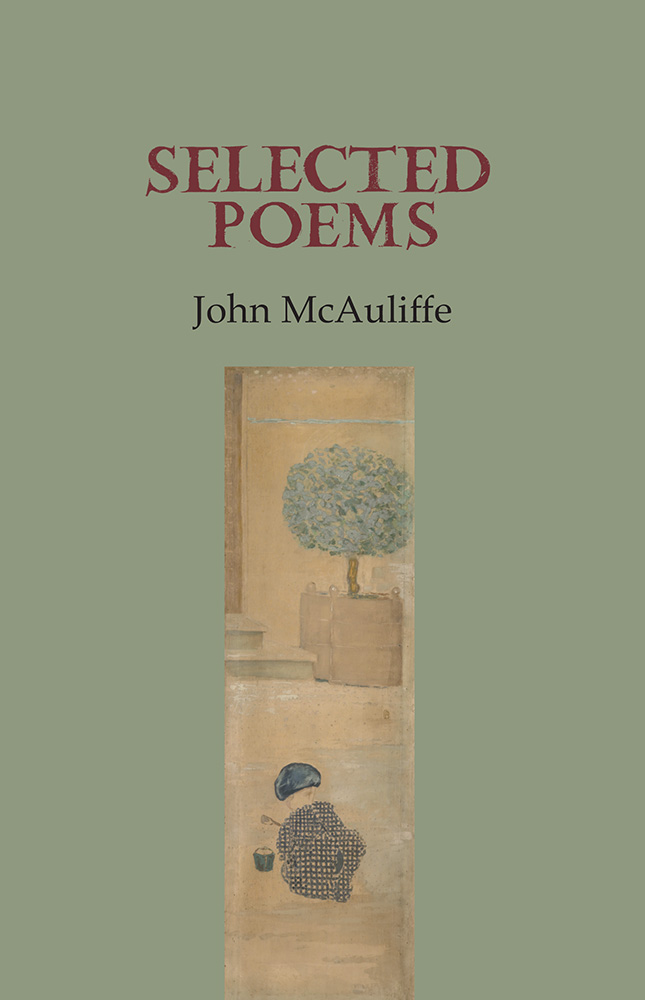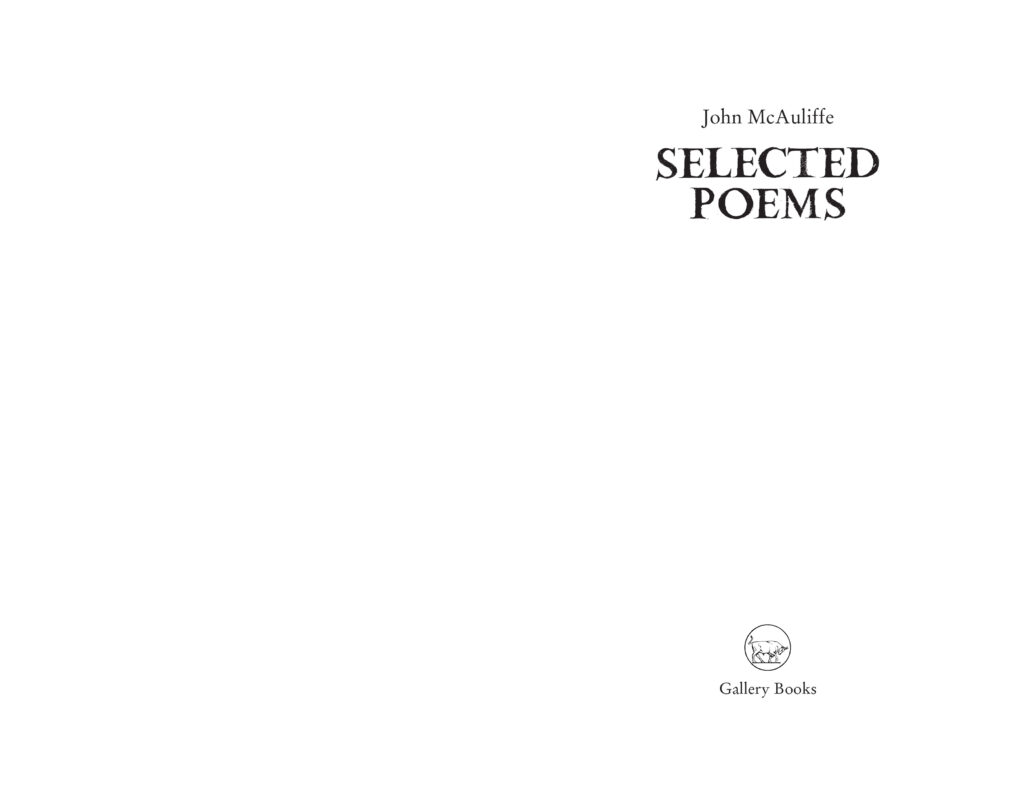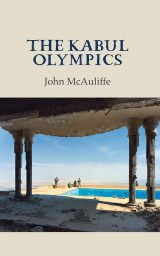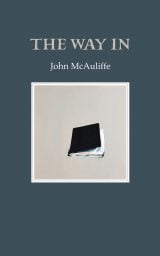Over twenty years John McAuliffe’s five books have given his readers a great abundance. In their ‘parallel universes’ his poems chart the domestic weather and undercurrents of modern life, return to the river of his home town, report on the streets of the city he works in and the wider world. His poems compress feeling and occasion into something like song, in lyrics, narratives, translations and ballads, treating travel, friendship, the lives of writers and political figures, ancient history and the recent past, parenthood and childhood, all with the freshly-made texture of worlds suddenly coming to life as we read them. Selected Poems shows for the first time the range of ‘one of the most gifted and versatile poets of his generation’ (Poetry Book Society).
‘McAuliffe’s gift is to be mindful of elsewheres. He swerves to effect: his shrewd sideways and backwards glances count, pouring light on a subject from several directions simultaneously. Any given moment is likely to be underpinned by what went on before or what is to come. He knows the power of parallel universes.’ — Kate Kellaway, The Observer
‘We find in this Selected Poems a poet confidently charting a life, salvaging meaning and some daily celebration worth observance. . . These selections, carefully curated, show a poet attuned and in tune to the sound of his own footsteps, the impulse of his own existence, of those close to him in the domestic realm, of the poets and authors he is reading from across the ages, of neighbours ––whether the shopkeeper in Listowel or the neighbour in Manchester, or even, as alluded to earlier, to the ghost who inhabited the space he now finds himself in.
And when our every step, every turn of the wheel, has become overwhelmed by a tsunami of information, of noise, of distraction, the poet must ask, after the fashion of Heaney, how can you enjoy the quiet life, when all around you is in tumult? And we find McAuliffe needing to be selective in where his gaze falls, what line his pen follows. And while noting the coming storm, keeping an eye just a few steps ahead may be the saving grace as poet and reader keep moving onward’. — Keith Payne, Dublin Review of Books
Into the domain of the imagined
Seamus Heaney once said that poetry exists on the frontier between the world we know and “the domain of the imagined” The art of course is to manage the balance between them. It is something that John McAuliffe does wonderfully. Time and again you think yourself in one of these worlds to find that it is permeated by the other.
It is tempting at first reading to describe McAuliffe’s work as domestic, and it is indeed founded securely in the everyday But then you find that the domestic of the everyday is prominent because it so often contains what is most important. The narrator of St Patrick’s Day is “enjoying the lamb” at an embassy launch (recognisable as the Irish Embassy in London by its proximity —” can anyone believe it?” — to “the palace”) because lamb has been “given up for Lent at home”. But between the lamb at the opening and the toast to the minister at the end, the imagination has wandered freely from “outdoorsy weather”, cycling to work in the “hi-vis vest” he thought he had lost, to remembering buying falafels from a street cart-to be recalled to the present by the light, the “hi-vis, blinding element”.
This kind of linguistic echoing, which operates almost under the surface of the poem, means the reader, unlike the poet, can’t let their attention stray. In that same poem the narrator has recalled his “blue morning”, spent in an artist’s studio across town. Is the “blue” transferred from the artist’s palette? It seems more than that; the next poem, The Places, evokes “the blue mood” of the distant town he returns to annually “with its special combinations of cloud”.
McAuliffe’s language, which seems so clear and circumstantial, is rootedly versatile and inventive. One of the home keys is Irish vernacular — “what harm”, “quiet out”, “ye’re”, “do the ware” — but it is also a language that carries its learning lightly.
Edmund Spenser lurks in the background of the brilliant poem Secretarial in the sequence significantly called Home, Again (whose comma maybe recalls Tom Paulin’s title A Nation, Yet Again). The truculent Colin in McAuliffe’s poem is closely related to Spenser’s Colin Clout (he returns later in the book in Colin, Again) who rejoiced in his return home “again”. This Irish Colin is not impressed by McAuliffe’s returning to Ireland in a car with an English registration: “No one,/ it seems he had to tell me this,
no one belonging to them ever had/ to go over to England.” It may be Spenser’s castle at Kilcolman that is being sought out maybe . . .
In any case “home” is a complex word here. It is at least as much Manchester as McAuliffe’s native Listowel (to which his Cork family were interlopers anyway). The book is full of Manchester locations — Longford Park, Fog Lane Park-as well as Irish places: Rossaveal, the Listowel Arms, Jane Eyre in Derry. It is a very located poetry The finest poem here, and the one which shows the poet’s imaginative and emotional range at its most profound, is City of Trees, 22 May 2017, about the Manchester Arena bombing, with a marvellous epigraph from Philip Larkin: Their greenness is a kind of grief. In the same way that the mind wanders in St Patrick’s Day, many less grievous associations with Manchester are woven in here: the two Irish pubs “The Clarence and the Whitworth”; Fallowfield; the Morrison’s in Chorlton; Aguero’s goal of May 13th, 2020.
For that, McAuliffe typically supplies circumstantial context: while the poet is “digging in the spuds”, “Agueroooo going global/ on the end of Balotelli’s flick” (we think of Mick Imlah’s observation that sport matters because it doesn’t matter). The poem concludes with a kind of numbness “as we move on from the rooms/ and fields and trees of the city’s hundred towns/ whose separating griefs harden and endure”. No single location is exclusively home, though; Ledwidge in Manchester recalls that Francis Ledwidge, the author of Lament for Thomas MacDonagh, was in hospital in Manchester when he heard of the Easter Rising and was sent to his death at Ypres.
McAuliffe is a citizen of the world, so his concerns range beyond the complexities of Irish-English relations. Another of the great poems here is The Kabul Olympics, the title poem of his 2020 volume, about the death of his friend· and creative writing student, the novelist and humanitarian Caroline Chisholm, who was inspired to swim the English Channel partly by the sufferings of refugees in the Calais camps.
It is not easy to do justice in brief to this good-humoured, generous-spirited, learned book. McAuliffe’s learning is always put to work. Today’s Imperative
is a brilliant relocation of Horace’s Ode 7 from Book 1 from Greek places to Irish and English environments — “bogland . . . Man-made canals and urban decay” Horace’s narrator (like Dante and Tennyson’s Ulysses) urges his followers to set off again; McAuliffe’s imperative is to appreciate the home virtues and leave the “grind” to tomorrow more grudgingly. Like Heaney’s Anything Can Happen, this application of a Horace text is well “after” Horace. But, for all the amiable good humour of the voice of these poems, they never stray far from the things that really matter in a modern life. The domain of the imagined is always at the service of the world we know, to cast light on it.
— Bernard O’Donoghue, The Irish Times





